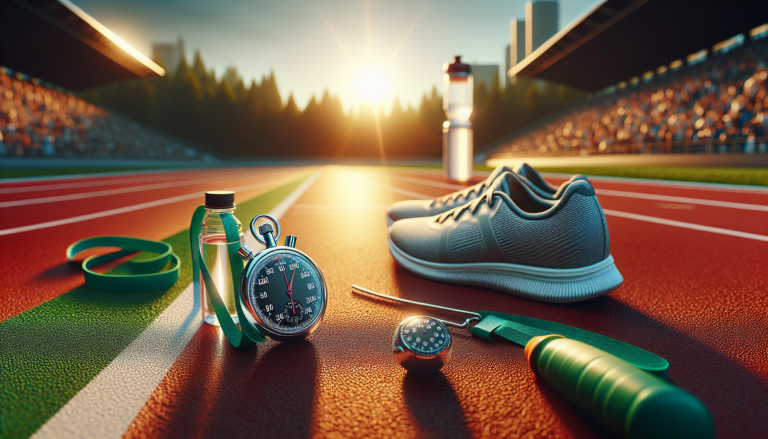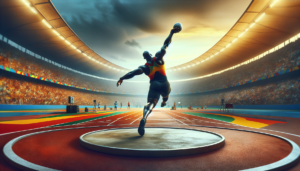The 800 meter dash is a prestigious event in middle-distance running that showcases the perfect blend of speed and endurance. It demands a unique set of skills from athletes, who must maintain a high pace while strategically navigating the two-lap race. The event has produced some of the most memorable moments in athletics history, with elite runners pushing the boundaries of human performance.
Introduction to the Fastest 800 Meter Dash
Overview of the 800 Meter Dash
The 800 meter dash, also known as the 800m race, is a middle-distance running event in track and field competitions. It requires athletes to complete two laps around a standard 400-meter outdoor track or 200-meter indoor track. The race begins with runners starting in staggered positions, each in their designated lane. After the first 100 meters, runners can break from their lanes and aim for the inside position.
The 800m race is a test of both speed and endurance, as athletes must maintain a fast pace throughout the two laps while also conserving enough energy for a strong finish. Runners employ various strategies, such as pacing and positioning, to optimize their performance. The event is known for its exciting finishes, where athletes often engage in a fierce battle down the final straightaway.
Significance of the 800 Meter Dash in Athletics
The 800 meter dash holds a significant place in the world of athletics. It is contested at major international competitions, including the Olympic Games and the World Athletics Championships. Winning an 800m gold medal is considered a prestigious achievement, as it demonstrates an athlete’s mastery of both speed and endurance.
The event has a rich history, with numerous iconic moments and record-breaking performances. It has produced legendary athletes who have left an indelible mark on the sport. The 800m race continues to captivate audiences worldwide, as fans eagerly anticipate the thrilling battles and impressive displays of athletic prowess.
Moreover, the 800 meter dash serves as a crucial stepping stone for athletes aiming to excel in other middle-distance events, such as the 1500 meters or the mile. Success in the 800m often indicates an athlete’s potential to dominate in longer distances. The skills and strategies developed in the 800m race are transferable to other middle-distance events.
David Rudisha and His World Record
David Rudisha’s Historic Performance
One of the most remarkable moments in the history of the 800 meter dash occurred during the London 2012 Olympics. Kenya’s David Rudisha delivered a breathtaking performance in the Men’s 800m Final, setting a new world record of 1:40.91. Rudisha’s run was a display of sheer dominance and athletic brilliance.
Rudisha took control of the race from the start, setting a blistering pace that left his competitors struggling to keep up. His regal gait and smooth strides made it look effortless as he maintained his speed throughout the two laps. Rudisha’s split times were astonishing, as he crossed the 400-meter mark in a swift 49.28 seconds.
As Rudisha entered the final straightaway, the anticipation grew among the spectators. He showed no signs of fatigue and continued to power through, extending his lead with each stride. Rudisha crossed the finish line in a world record time of 1:40.91, becoming the first man to break the 1:41 barrier in the 800 meters.
Breaking Down the 1:40.91 Record
David Rudisha’s world record of 1:40.91 in the 800 meter dash is a testament to his exceptional athletic abilities. To put his achievement into perspective, let’s break down the significance of this time:
- Rudisha became the first and only man to run the 800 meters under 1:41.
- His time was 0.91 seconds faster than his own previous world record of 1:41.01, set in 2010.
- Rudisha’s average pace was an astonishing 27.65 seconds per 200 meters.
- He ran the first lap in 49.28 seconds and the second lap in 51.63 seconds, showcasing his ability to maintain speed.
Rudisha’s world record is a benchmark that many athletes aspire to surpass. It showcases the incredible potential of human performance and sets a high standard for future generations of 800m runners. Rudisha himself believes that he could have run even faster, suggesting that there is still room for improvement in this event.
Impact of Rudisha’s Record on Athletics
David Rudisha’s world record in the 800 meter dash has had a profound impact on the world of athletics. His performance at the London 2012 Olympics not only secured his place in history but also raised the bar for middle-distance running.
Rudisha’s record has inspired a new generation of athletes to pursue excellence in the 800m event. It has motivated runners worldwide to train harder, push their limits, and strive for greatness. Rudisha’s accomplishment has shown that with dedication, discipline, and talent, extraordinary feats are possible.
Moreover, Rudisha’s record has elevated the profile of the 800 meter dash. It has brought increased attention and excitement to the event, attracting more athletes and fans. Rudisha’s performance has also sparked discussions about race strategies, pacing, and the physical and mental demands of the 800m race.
Training Tips for the 800 Meter Dash
Essential Training Techniques
To excel in the 800 meter dash, athletes must incorporate specific training techniques into their regimen. Here are some essential training methods for 800m runners:
- Interval Training: Interval training involves alternating between high-intensity efforts and recovery periods. For 800m runners, this can include repetitions of 200m, 400m, or 600m intervals at race pace or slightly faster, with rest intervals in between.
- Hill Repetitions: Running uphill helps develop leg strength, power, and endurance. Incorporating hill repetitions into training can improve an athlete’s ability to maintain speed and form during the 800m race.
- Fartlek Training: Fartlek, which means “speed play” in Swedish, involves continuous running with variations in pace. Athletes can alternate between fast and slow running, simulating the changes in speed experienced during an 800m race.
Building Endurance and Speed
To succeed in the 800 meter dash, athletes must possess a combination of endurance and speed. Building these qualities requires a well-structured training plan:
- Endurance Training: Endurance is crucial for maintaining a high pace throughout the two laps of the 800m race. Athletes can improve their endurance through longer, steady-state runs at a moderate pace. Gradually increasing the distance and duration of these runs helps build aerobic capacity.
- Speed Training: While endurance is important, 800m runners also need to develop speed. Incorporating sprint training, such as short, explosive intervals (e.g., 50m or 100m sprints), helps improve an athlete’s speed and power. Plyometric exercises and weightlifting can also enhance speed and muscular strength.
Finding the right balance between endurance and speed training is crucial for 800m runners. Coaches and athletes often employ periodization, dividing the training year into specific phases that focus on different aspects of fitness. This approach allows athletes to peak at the right time for major competitions.
Importance of Recovery and Nutrition
In addition to physical training, recovery and nutrition play vital roles in an 800m runner’s performance. Proper recovery allows the body to adapt to the stresses of training and reduces the risk of injury:
- Rest and Sleep: Adequate rest and sleep are essential for muscle repair and overall recovery. Athletes should aim for 7-9 hours of quality sleep each night and incorporate rest days into their training schedule.
- Nutrition: A balanced and nutritious diet is crucial for fueling training and recovery. 800m runners should focus on consuming a mix of carbohydrates, lean proteins, and healthy fats. Staying hydrated by drinking enough water is also important, especially during intense training sessions.
- Active Recovery: On rest days or between hard training sessions, athletes can engage in active recovery activities such as light jogging, swimming, or yoga. These low-intensity exercises promote blood flow and aid in muscle recovery.
By prioritizing recovery and nutrition, 800m runners can optimize their training adaptations, reduce the risk of burnout or injury, and maintain peak performance throughout the season.
Race Strategies for the 800 Meter Dash
Pacing and Positioning
Pacing and positioning are critical elements of a successful 800 meter race strategy. Here are some key considerations:
- Starting Position: The 800m race begins with runners in staggered positions. It’s important to start strong and establish a good position early in the race. Runners should aim to be near the front of the pack after the first 100 meters when they break from their lanes.
- First Lap Pacing: The first lap of the 800m race is crucial for setting the tone. Runners should aim to run the first lap at a pace slightly faster than their average race pace. However, it’s important not to start too fast and risk burning out before the finish.
- Positioning in the Pack: During the race, runners should try to maintain a position near the front of the pack. This allows them to avoid getting boxed in and have more control over their race. However, it’s also important to be mindful of the pace and not get carried away with the leaders if they are running too fast.
Effective pacing and positioning require a good sense of pace and tactical awareness. Runners must be able to judge their own pace and make quick decisions based on the race dynamics. Practicing pacing during training sessions and developing a race plan can help athletes execute their strategy effectively on race day.
Executing the Final Kick
The final kick, or the last 200-300 meters of the 800m race, is often where the race is won or lost. It’s the moment when athletes unleash their remaining energy and sprint towards the finish line. Here are some tips for executing a strong final kick:
- Timing: The timing of the final kick is crucial. Runners should aim to start their kick with about 200-250 meters to go. Starting too early can lead to premature fatigue, while starting too late may not leave enough time to catch the leaders.
- Mental Focus: Executing a strong final kick requires mental toughness and focus. Runners must be prepared to push through the pain and discomfort of the final sprint. Visualizing a successful finish and maintaining a positive mindset can help athletes summon the necessary energy and determination.
- Form and Technique: Maintaining proper running form and technique during the final kick is essential. Runners should focus on maintaining a tall posture, driving their arms, and lifting their knees. Avoiding excessive tension and maintaining relaxed shoulders can help conserve energy for the final push.
Practicing the final kick during training sessions can help athletes develop the necessary speed, endurance, and mental toughness. Incorporating specific workouts, such as fast finishes or sprints at the end of intervals, can simulate the demands of the final kick and prepare runners for race day.
Notable 800 Meter Dash Performances
Top 800 Meter Dash Records
The 800 meter dash has witnessed numerous remarkable performances throughout its history. Here are some of the top 800m records:
| Athlete | Time | Event | Date |
|---|---|---|---|
| David Rudisha (Kenya) | 1:40.91 | London 2012 Olympics | August 9, 2012 |
| Wilson Kipketer (Denmark) | 1:41.11 | Cologne, Germany | August 24, 1997 |
| Sebastian Coe (Great Britain) | 1:41.73 | Florence, Italy | June 10, 1981 |
| Nijel Amos (Botswana) | 1:41.73 | London 2012 Olympics | August 9, 2012 |
These extraordinary performances showcase the incredible talent and dedication of the athletes who have pushed the boundaries of what is possible in the 800 meter dash. Each record-breaking run has inspired future generations of runners to strive for excellence and continue raising the bar in this event.
Rising Stars in the 800 Meter Dash
The future of the 800 meter dash looks bright, with several rising stars poised to make their mark on the event. Here are a few promising athletes to watch:
- Emmanuel Kipkurui Korir (Kenya): Korir has shown incredible potential, winning the 800m gold medal at the 2018 World Athletics Continental Cup. He has a personal best of 1:42.05 and is expected to be a strong contender in future international competitions.
- Donavan Brazier (USA): Brazier has been making waves in the 800m event, setting the North American record with a time of 1:42.34 in 2019. He has also won gold medals at the World Athletics Championships and the Pan American Games.
- Athing Mu (USA): At just 19 years old, Mu has already made a name for herself in the women’s 800m event. She set a national record of 1:55.21 in 2021 and won the gold medal at the Tokyo Olympics, showcasing her immense talent and potential for future success.
These rising stars, along with other talented athletes from around the world, are set to bring excitement and fierce competition to the 800 meter dash in the coming years. As they continue to train, develop, and push their limits, we can expect to see more record-breaking performances and thrilling races in this prestigious event.
Conclusion
Summary of Key Points
The 800 meter dash is a captivating event that combines speed, endurance, and strategy. Throughout this article, we have explored various aspects of the fastest 800m performances:
- David Rudisha’s world record of 1:40.91 set at the London 2012 Olympics stands as a remarkable achievement in the history of the event.
- Effective training for the 800m dash involves a combination of interval training, endurance work, speed development, and proper recovery and nutrition.
- Race strategies, including pacing, positioning, and executing a strong final kick, are crucial for success in the 800m event.
- The 800m dash has witnessed numerous record-breaking performances and continues to attract talented athletes from around the world.
By understanding these key aspects of the 800 meter dash, athletes, coaches, and fans can appreciate the dedication, skill, and athleticism required to excel in this prestigious event.
Future of the 800 Meter Dash
The future of the 800 meter dash looks promising, with a new generation of talented athletes ready to leave their mark on the event. As training methods continue to evolve and athletes push the boundaries of human performance, we can expect to see even faster times and more thrilling competitions in the coming years.
The 800m event will continue to be a highlight of major international competitions, such as the Olympic Games and the World Athletics Championships. The rivalry among top athletes from different countries will keep fans on the edge of their seats, as they witness the intense battles and strategic moves that unfold on the track.
Moreover, the 800 meter dash will serve as an inspiration for aspiring runners worldwide. The stories of dedication, perseverance, and triumph of the athletes who have excelled in this event will motivate future generations to take up middle-distance running and strive for excellence.
As we look forward to the future of the 800 meter dash, we can anticipate more record-breaking moments, fierce competitions, and the emergence of new stars who will continue to push the limits of what is possible in this captivating event.
#ED#





